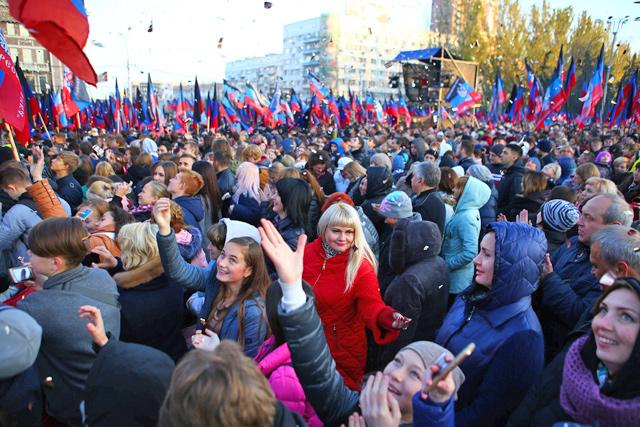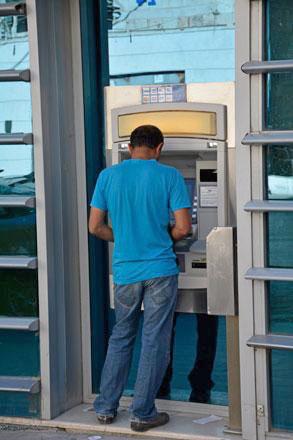You are here
Debt collectors strike fear in recession-hit Russia
By AFP - Mar 02,2016 - Last updated at Mar 02,2016
MOSCOW — "If you don't die by yourself, we'll help you," threaten the phone messages that Natalya, a 69-year-old Russian pensioner, has been receiving for months after falling further behind on her credit card payments.
Resorting to harassment and threats of violence, debt collectors sent out by banks to recover money have become notorious in Russia and, many complain, usually face no punishment.
But as Russia's unpaid debt soars to dramatic levels due to an economic crisis, authorities are now seeking to regulate the cowboy sector.
For Natalya, who declined to give her full name due to fear of reprisal, the problems began last summer.
She had to go into hospital and was forced to stop the part-time car park supervisor's job that supplements her monthly pension of around 150 euros ($164) plus the 70-euro disability benefit of her son, who lives with her.
It became impossible for Natalya, who lives in the region outside Moscow, to cover the monthly bills for her credit card which she says come to about 5,000 rubles (60 euros, $66), although she does not understand exactly what the amount represents.
Interest rates can reach as high as 20 per cent for longer term loans such as mortgages, and much higher for short term ones.
The menacing phone calls have become increasingly frequent, "day and night", she said.
Noting the telephone numbers used by the debt collectors, she has listed up to 18 calls per day.
The callers' tone has also grown more menacing, with threats of violence.
"We will come to your home to see if you have any gold teeth," or "we will confiscate your property", and "we will make you run for the cemetery" — just some of the threats she received.
"They got me into such a state that I didn't have the strength to leave my flat. I begged them but to no avail. They just kept on shouting and insulting me," she said, fighting back tears.
She finally went to a lawyers' association to attempt to get her repayments cut to a manageable level.
Mounting unpaid loans
Natalya's case is far from unusual, as are the tactics used against her.
Russian media has carried reports of bailiffs beating up people with debts, posting insults in the entrance halls of their apartment blocks and threatening to attack their children.
"Over the last year, we have seen a wave of complaints," said Irina Malinina, a lawyer who heads a group helping people with unpaid loans.
"Delays or failures to make payments have increased so visits and phone calls from debt collectors have gone up," she added.
Collapsing oil prices and sanctions on Russia due to the conflict in Ukraine have plunged the country into recession, prompting a drop in spending power that caught out many Russians who had taken loans during the boom years when credit was available with almost no background cheques.
Payments were late on nearly 18 per cent of personal loans on January 1, up from 10.3 per cent a year earlier, according to the National Bureau of Credit Histories, a company that holds a large database of credit history records.
Exacerbating the situation, banks have sought to unload their bad loans by selling them to debt collector agencies.
Banks have also tightened the criteria for granting loans, pushing Russians towards small microcredit organisations offering short-term "payday" loans.
The situation is particularly difficult in the provinces, where the standard of living is low and people are ill-informed about their legal rights.
Anti-debt collector app
Siberian programmer Yevgeny Pyatkovsky, who is in his 30s, has created a smartphone app that allows users to add numbers of debt collectors to a database and block their calls.
Designed initially for his own family, the Antikollektor app now has 300,000 users, he said.
He explained that the app has a dual aim: to protect relatives of debtors, who are sometimes also targeted, and to spare people who owe money from the "enormous stress" of harassment by debt collectors.
After long ignoring the issue, the authorities finally took notice as media reports of abuses by debt collectors have multiplied.
The investigative committee and the prosecutor general's office vowed to severely punish a debt collector in the Volga city of Ulyanovsk, who in January threw a Molotov cocktail into the house of a man who had taken out a small loan, causing his two-year-old grandson to suffer serious burns.
In mid-February, the speakers of the upper and lower houses of parliament, Sergei Naryshkin and Valentina Matviyenko, submitted a draft law regulating debt collection.
It limits the lawful number of phone calls debt collectors can make and bans them altogether at night, as well as penalising harassment.
But Malinina believes it does not go far enough.
"The constitution already bans entering properties, making threats and resorting to physical violence," she complained.
Related Articles
DONETSK, Ukraine — Voters in rebel-held east Ukraine chose new leaders on Sunday after Russia defied Western calls not to sabotage peace tal
AMMAN — Loans have become a lifeline for many Jordanians, especially after the pandemic, according to a sociologist.According to the 2017-20
DOHA — Credit cards on the limit, huge bank borrowings and a struggle to repay loans: these are the personal debt problems of some Qataris d

















